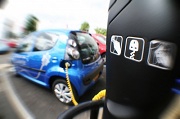As electric cars enter mass production on a greater scale we are seeing them be a more a viable option for the consumer.
As the cost of electric vehicles decreases, there’s going to be a number of infrastructure and economic changes around the world.
We’ll look into a few of these changes.
Nissan’s LEAF, released in December 2010, is priced at $30,000 and has a range of 160km and a top speed of 140km/h. The car also comes with a number of telemetry options that allows the consumer to locate charging stations (a quick charge of 80% capacity can be achieved in 30 minutes). The price tag shows promise, as electric cars move down to more competitive price levels with petrol powered cars.

As greener cars become more competitive we can look forward to a cleaner future
We’re already seeing in European countries, where considerable government support exists for electric car consumers, a number of infrastructure changes taking place. The most noticeable of these is the availability of charging stations for electric cars. It’s little surprise that the governments of Europe are reacting quickly to green issues, as acid rain and dangerous smogs have been a problem over Europe for some time now.
Another major change will be in the running costs of cars.
The price of travelling 100km is around $2.50 in an electric vehicle, as opposed to around $16 in a petrol powered vehicle. This could fall even further as greater demands are placed on power grids, and economies of scale cause grid power prices to fall.
Grid power demands increasing also presents opportunities for renewable energy sources to be used in place of fossil fuel power generation methods.
The trend of many European nations to move towards nuclear power will further be rewarded as we see cars effectively being powered by the highly efficient and relatively clean process of nuclear power generation.
Directly and aesthetically, the changes will be massive as well. Petrol engines run at around a 35% efficiency, with the output of the engine being 35% desired kinetic energy and the remaining 65% of energy is released as noise and heat. A lack of direct exhaust emissions from vehicles will see a large decrease in the haze that hangs over most large cities. Traffic noise will be a thing of the past too. It’s an attractive future we look forward to with electric vehicles filling our roads.
We’ll see a massive explosion in battery pack industry
The research and development and production of batteries is already receiving far greater attention from governments and industry. This is primarily because battery packs make up nearly half the cost of an electric vehicle. Expect the business that proliferates the next major discovery in battery pack tech to become extremely rich, extremely fast. Expect some scares in this industry as some unscrupulous operators try to push out potentially dangerous or ineffective battery packs in an attempt to save costs.
Overall, the changes to society will be huge.
Noiseless roads, less heat pollution, less smog, cheaper electricity, cheaper transport costs, less acid rain and a boom in the battery production industry.
It’s going to be huge and I hope we’re all looking forwards to the change.
This article on electric cars was brought to you by the car cleaning experts at Car Care. They provide expert car detailing Melbourne and beyond. If you would like to read more by us on the future of transportation, perhaps you would like to have a read of – The Electric Cars Achilles Heel – The Price Of Batteries
Image: Paul Martin Eldridge / FreeDigitalPhotos.net
